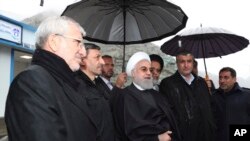In the Middle East, even virus outbreaks are political.
The coronavirus has killed 26 people in Iran the highest toll outside of China where it originated. Many of the over 240 confirmed cases in the region have links to Iran, including dozens in Kuwait and Bahrain, six in Iraq and two in Lebanon.
That spread has put renewed scrutiny on Tehran, with many of its regional foes blaming it for mishandling the outbreak.
In sharp contrast to Europe, where countries kept borders with Italy open despite a cluster of virus cases there, Iran's neighbors have all announced measures to cut links with the country, either completely closing their borders and suspending air traffic or limiting travel. In an extraordinary move that reflects the growing concern, Saudi Arabia on Thursday banned foreign pilgrims from entering the kingdom to visit Islam's holiest sites in Mecca.
As the virus spreads, so has the criticism directed at Iran. But it has fallen along familiar political fault lines, with regional politics shaping the accusations.
In the Gulf countries where anti-Iran sentiment runs high, Saudi-funded media was quick to blame Iran.
“Something is rotten in the state of Persia: the Islamic Republic of Iran is engaging in a large-scale cover-up of the coronavirus epidemic that could wreak misery on the lives of millions,'' wrote Mohammed Alyahya, the editor-in-chief of Al-Arabiya English outlet based in Dubai.
He added: “This is not a government that can be trusted to tell the truth, even when lives are at stake.''
One Dubai-based newspaper wrongly claimed in a front-page headline that all cases of the new coronavirus in the region came from the Islamic Republic. That would be convenient for the United Arab Emirates, a federation of seven sheikhdoms home to Dubai whose 13 coronavirus cases predominantly trace back to China.
The UAE has projected the Chinese flag on the world's tallest building and ensured long-haul flights by local carriers Etihad and Emirates continue to Beijing even as other airlines stopped flying to mainland China. That's in part due to hopes that Chinese tourists and investments will help the country's ailing real estate market and wider economy as oil prices remain low.
Blaming Iran for the outbreak increases Iran's isolation and also comes as both the UAE and Saudi Arabia have encouraged the harder line against Tehran that has been taken by U.S. President Donald Trump.
In countries like Iraq and Lebanon, where politicians and public opinion are sharply split between pro- and anti-Iran camps, the reaction has been predictable. Many Lebanese who support an Iran-allied political coalition led by the Shiite Muslim Hezbollah group have remained silent on the issue, while some backers of rival groups blame Tehran for the spread of the virus into the country.
“Thank you, Iran, for allowing a jet carrying people infected with coronavirus to enter our airspace. Is this the way countries cooperate and is this the help that your promised Lebanon?'' said the editorial of the local MTV station, a harsh critic of Hezbollah.
The country's two coronavirus cases are two Lebanese women who returned home on a Feb. 20 flight from Qom, the Iranian city hit hardest by the virus.
Critics assailed Tehran and the Hezbollah-supported Lebanese government for allowing the plane to land in Beirut. Protesters picketed the Health Ministry on Wednesday, urging authorities to ban flights from countries with high infection rates.
Hezbollah's deputy secretary general Naim Kassem hit back, saying that politicizing the outbreak is “immoral” and that only people “with no conscience or humanity” would do so.
In neighboring Iraq, where anti-government protesters have also been railing against Iran's heavy-handed political influence in their country, many people have expressed open resentment at Tehran's handling of the crisis as well as the performance of their own Iran-allied caretaker government.
The government closed Iraq's borders to Iranian nationals after an Iranian religious student tested positive for the virus in the Shiite holy city of Najaf this week, but kept the frontier open to Iraqis.
Since then, four more members of the same family in the northern city of Kirkuk and a young man in the capital of Baghdad have tested positive after returning from Iran.
“We sympathize with the Iranian people from a humanitarian point of view, but we will not sympathize with the Iranian government no matter what,'' said Muhammad Baqir, a 22-year-old protester from Najaf. “Iran did not offer anything to Iraq. All it did is steal and support militias and now it is exporting viruses,” he added, saying the outbreak is sure to blunt the momentum of Iraq's protest movement over contagion fears.
Ihsan al-Shammari, an Iraqi political analyst, said the outbreak came at a time when Iraqis already were demonstrating against Iranian interference in their country.
“The appearance of the coronavirus and its arrival in Iraq via Iran exacerbates this anger and serves as yet another catalyst against Iran,” he said.
Afghanistan confirmed its first coronavirus case Monday, and the victim had crossed into the country from Iran over the border into Herat province. There was general anger and blame that the government in Kabul was not doing enough to protect its citizens.
Shakeb Soroush, a 21-year-old university student in Kabul, said both China and Iran were careless and didn't act quickly enough to halt the spread of the virus but “we can't blame them for everything.”
While Afghanistan has closed its borders with Iran, Soroush said there were unofficial crossing points that are not under government control.
“We are so concerned that the death toll could rise here because we don't have enough facilities,” he added.





